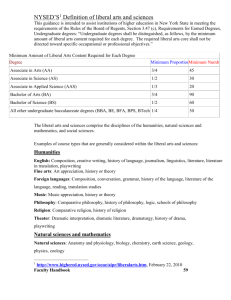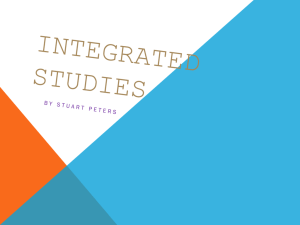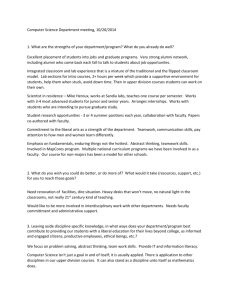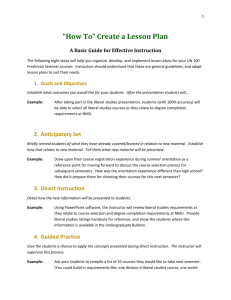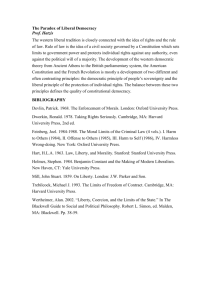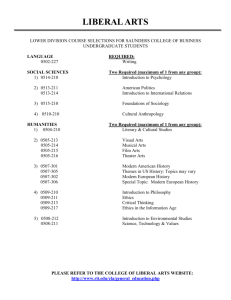Creating Study Guides - Colorado Mesa University
advertisement
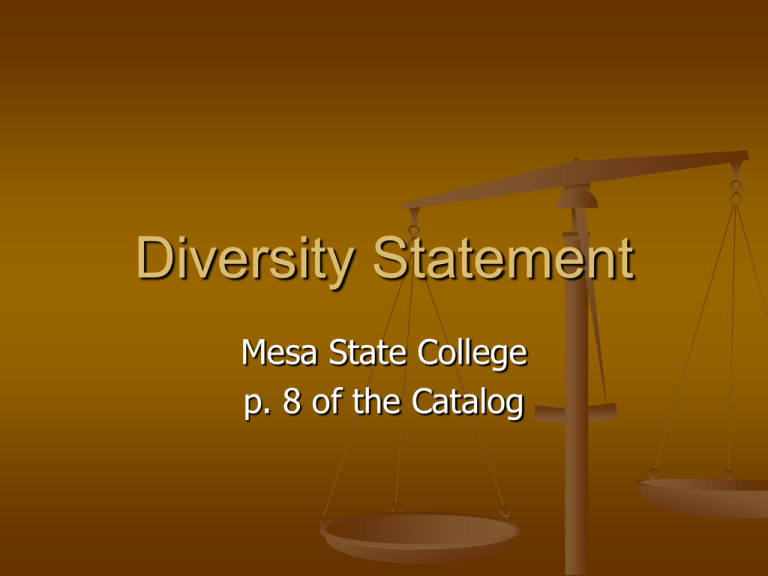
Diversity Statement Mesa State College p. 8 of the Catalog Following is a statement of philosophy on diversity which has been adopted by the faculty at Mesa State College: Mesa State College is a community of scholars in the LIBERAL ARTS TRADITION. As faculty we believe that all people, regardless of gender, linguistic heritage, marital status, origin, religion, or sexual orientation, have something worthwhile to contribute and that these contributions benefit us all. Following is a statement of philosophy on diversity which has been adopted by the faculty at Mesa State College: Therefore, we intend that within our academic community all cultural differences will be treated with equal respect and tolerance. We desire that our students have the opportunity to appreciate the diversity in our modern world, and encourage them to partake of the resources available within our community. Following is a statement of philosophy on diversity which has been adopted by the faculty at Mesa State College: As faculty we pledge ourselves to provide as many divergent cultural experiences for our students as the resources of the college and the needs of our disciplines allow. Following is a statement of philosophy on diversity which has been adopted by the faculty at Mesa State College: To further tolerance and appreciation for our society’s diversity, Mesa State requires that all graduates fulfill General Education requirements. In doing so, we honor the validity of a LIBERAL EDUCATION. Following is a statement of philosophy on diversity which has been adopted by the faculty at Mesa State College: We hope that the experience will help our students understand how to appreciate the true diversity of the world. Because diversity promotes multiple opinions, techniques, viewpoints, and approaches, it is not the individual courses within the General Education program which we believe will further the above-stated goals, but the whole experience of the program itself. LIBERAL -- Adjective Main Entry: 1lib·er·al Pronunciation: 'li-b(&-)r&l Function: adjective Etymology: Middle English, from Middle French, from Latin liberalis suitable for a freeman, generous, from liber free; perhaps akin to Old English lEodan to grow, Greek eleutheros free Date: 14th century 1 a : of, relating to, or based on the liberal arts <liberal education> b archaic : of or befitting a man of free birth 2 a : marked by generosity : OPENHANDED <a liberal giver> b : given or provided in a generous and openhanded way <a liberal meal> c : AMPLE, FULL 3 obsolete : lacking moral restraint : LICENTIOUS 4 : not literal or strict : LOOSE <a liberal translation> 5 : BROAD-MINDED; especially : not bound by authoritarianism, orthodoxy, or traditional forms 6 a : of, favoring, or based upon the principles of liberalism b capitalized : of or constituting a political party advocating or associated with the principles of political liberalism; especially : of or constituting a political party in the United Kingdom associated with ideals of individual especially economic freedom, greater individual participation in government, and constitutional, political, and administrative reforms designed to secure these objectives Liberal -- Noun Main Entry: 2liberal Function: noun Date: 1820 : a person who is liberal: as a : one who is open-minded or not strict in the observance of orthodox, traditional, or established forms or ways b capitalized : a member or supporter of a liberal political party c : an advocate or adherent of liberalism especially in individual rights Liberal Arts Main Entry: liberal arts Function: noun plural Date: 14th century 1 : the medieval studies comprising the trivium and quadrivium 2 : the studies (as language, philosophy, history, literature, abstract science) in a college or university intended to provide chiefly general knowledge and to develop the general intellectual capacities (as reason and judgment) as opposed to professional or vocational skills The General Education Goals A MSC graduate should: 1. Be able to communicate effectively in English 2. Possess mathematical skills. 3. Be aware of the great moral, ethical, and philosophical questions which have endured through the ages. 4. Have some knowledge of the origins of our own culture and the existence of others. The General Education Goals A MSC graduate should: 5. Be able to think critically and recognize issues across a broad spectrum of subjects. 6. Understand the complexities of our social, economic, and political environment. 7. Have a familiarity with the scientific approach to the biological, psychological and physical universe. The General Education Goals A MSC graduate should: 8. Appreciate the contributions of literature to our perceptions of ourselves and our world. 9. Appreciate the aesthetic spirit of mankind through a study of some aspect of the performing and visual arts. Discussion Questions Discuss the interconnections between Diversity, Liberal Arts and General Education. Do you, like the college and the faculty, see them as integral to a College Degree? Why are these values important to our society? Discussion Questions How would you define race? What does it mean to you? How many races do you think there are? What are they? How do you decide which race someone belongs to? Where do your ideas about race come from? What are the sources of your information? Look around the room. Who do you think is most likely to be similar to you biologically or genetically? Why? Post-Film Discussion Questions At the beginning of the film, the students were asked to predict whom they would be most like when their compared their DNA samples. How did the results compare with their expectations? Were you surprised? If so, why? Post-Film Discussion Questions Anthropologish Alan Goodman says that “to understand the why the idea of race is a biological myth requires a major paradigm shift.” Do you agree? Did the film present any information that shifted your thinking in a major way? If so, what? Post-Film Discussion Questions Towards the end of the film, the students are asked if they would trade their skin color. Would you trade yours? Would you trade your gender? Your sexual orientation? How would your life be different if you did? Post-Film Discussion Questions Turn of the century scientists like Frederick Hoffman drew scientific conclusions based on what they believed to be true. How are scientists today influenced by their beliefs or their social context? How are we all in our every day decisions?


